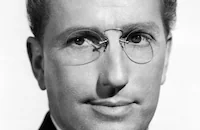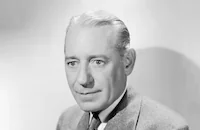Strange Bargain

Brief Synopsis
Cast & Crew
Will Price
Martha Scott
Jeffrey Lynn
Henry Morgan
Katherine Emery
Richard Gaines
Film Details
Technical Specs

Synopsis
Urged by his wife Georgia, Sam Wilson, a financially strapped assistant bookkeeper at a Beverly Hills securities firm, asks his boss, Malcolm Jarvis, for a modest raise. Instead of granting Sam's request, Jarvis reveals that his company is going bankrupt and Sam, a twelve-year veteran, is losing his job. After work that day, Jarvis invites Sam for a drink and tells him that, because of his failed financial situation, he wants to commit suicide. Jarvis also wants his wife Edna and son Sydney to collect on his $250,000 life insurance policy, but knows they will have to forfeit the money if his death is ruled a suicide. To assure his family's security, Jarvis offers Sam $10,000 to help make his suicide look like a murder. Although Sam refuses to consider his boss's idea, Jarvis calls him that evening and tells him that he is going through with his plan. Sam begs Jarvis to reconsider, then rushes to his Beverly Hills home. In the Jarvis library, Sam finds his employer's dead body, a gun lying near his hand and an envelope addressed to Sam. Following Jarvis' earlier instructions, Sam makes the room appear as though a robbery had taken place, then using Jarvis' gun, fires two rounds through the library window. After Sam throws the gun off the Santa Monica pier, he returns home and nervously hides the cash-filled envelope in his bedroom closet. The next morning, Georgia reads about Jarvis' death in the newspaper and suggests to Sam that they visit Edna to offer their condolences. At the Jarvis house, homicide detective Richard L. Webb interrogates Timothy Herne, Jarvis' partner, who freely admits that he and Jarvis did not get along. Later, Mrs. Jarvis, who says she was at her beach house at the time of the murder, asks Sam to oversee the firm temporarily. Webb then questions Sam and, sensing his nervousness, orders a tail put on him. That night, Sydney tells Sam and Georgia that he had seen Herne quarreling with his father just before his death, but had said nothing about it to Webb because he was sure Herne was innocent. To Georgia's surprise, Sam advises Sydney to keep the matter to himself. Herne, who plans to revamp the firm with his own money, then offers Sam a promotion to head bookkeeper. At the police station, Webb learns that two different guns were used in the crime and that Jarvis had recently increased the amount of his insurance. Suspecting that he is involved in the matter, Webb orders Sam to accompany him to see Mrs. Jarvis, who states that she was unaware of the increase in coverage. Webb then forces Herne to admit that he saw Jarvis just before his death, and makes Sam admit that he witnessed a fight between Jarvis and Herne earlier that day. Sure that Herne is about to be arrested, Sam is overcome with guilt, and as he and Georgia, who earlier had found the $10,000, drive to the Jarvis house, he confesses all. While Georgia waits for him in the car, Sam gives Mrs. Jarvis the $10,000, telling her about his involvement in the murder. To his astonishment, Mrs. Jarvis reveals that she shot her husband after he seemed to be reneging on his agreement to kill himself. Using the same gun she used on her husband, Mrs. Jarvis then shoots Sam, intending to make his death look like another suicide. After her first shot only grazes Sam, Mrs. Jarvis prepares to fire again when Webb appears and knocks the gun from her hand. Having heard her admission of guilt, Webb arrests Mrs. Jarvis and tells a relieved Sam that he is free to go.

Director
Will Price
Cast

Martha Scott

Jeffrey Lynn

Henry Morgan

Katherine Emery

Richard Gaines

Henry O'neill

Walter Sande
Michael Chapin
Arlene Gray
Raymond Roe
Robert Bray
Jim Nolan
Theodore Rand
Charles Flynn
Dan Foster
Betty Underwood
Nancy Valentine

John Hamilton
Joel Friedkin
Katherine Lytle
Wanda Cantlon
Bernice Young
Carl Sklover
Al Murphy
Crew
James Almond
James Altwies
C. Bakaleinikoff
Carroll Clark
Albert S. D'agostino
Lillie Hayward
Frederick Hollander
Terry Kellum
Frederic Knudtson
James Kurley
Harold Lewis
Gaston Longet
Joe Norin
Sid Rogell
Sam Ruman
Frank Sarver
Darrell Silvera
Fae Smith
Charles Straumer
J. H. Wallis
Mercy Weireter
Harry J. Wild

Film Details
Technical Specs

Articles
Strange Bargain -
By Frank Miller

Strange Bargain -
Martha Scott, 1914-2003
Martha Ellen Scott was born in Jamesport, Missouri on September 24, 1914, and raised in Kansas City, where a high school teacher encouraged her interest in acting. She majored in drama at the University of Michigan and after graduation, she joined The Globe Theatre Troupe, a stock company that performed truncated Shakespeare at the Chicago World's Fair in between 1933-34. She went to New York soon after and found work in radio and stock before playing making her breakthrough as Emily Webb in Our Town. When the play opened on Broadway in February 1938, Scott received glowing reviews in the pivotal role of Emily, the wistful girl-next-door in Grovers Corners, New Hampshire, who marries her high school sweetheart, dies in pregnancy and gets to relive a single day back on Earth. Her stage success brought her to Hollywood, where she continued her role in Sam Wood's film adaptation of Out Town (1940). Scott received an Academy Award nomination for best actress and was immediately hailed as the year's new female discovery.
She gave nicely understated performances in her next few films: as Jane Peyton Howard in Frank Lloyd's historical The Howards of Virginia (1940), opposite Cary Grant; the dedicated school teacher in Tay Garnett's Cheers for Miss Bishop (1941) in which she aged convincingly from 17 to 85; and as a devoted wife to preacher Frederic March in Irving Rapper's warm family drama One Foot in Heaven (1941). Sadly, Scott's maturity and sensitivity ran against the glamour-girl persona that was popular in the '40s (best embodied by stars like Lana Turner and Veronica Lake) and her film appearances were few and far between for the remainder of the decade.
Her fortunes brightened in the '50s, when she found roles in major productions, such as a suburban wife trapped in her home by fugitives, led by Humphrey Bogart, in William Wyler's taut The Desperate Hours (1955) and played Charlton Heston's mother in the Cecil B. Demille's The Ten Commandments (1956) and again for William Wyler in Ben-Hur (1959). Scott found steady work for the next 30 years in matronly roles, most notably on television, where she played Bob Newhart's mother on The Bob Newhart Show (1972-1978) and the mother of Sue Ellen Ewing on Dallas (1978-1991). Her second husband, pianist and Pulitzer Prize-winning composer Mel Powell, died in 1998. Survivors include a son and two daughters.
by Michael T. Toole
Martha Scott, 1914-2003
Quotes
Trivia
This film was the basis for an episode of "Murder, She Wrote" (1984). Many of the surviving cast members appear in the show, as does some of the original footage from the film.
Notes
The working title of this film was Sam Wynne. In records of the NYSA, the picture is listed under the title Sam Wilson. According to Hollywood Reporter, Frederic Ullman, Jr. was originally slated to produce the picture. Los Angeles Examiner reported in April 1948 that J. H. Wallis' story had been purchased as a vehicle for Pat O'Brien, while a June 1948 Los Angeles Times item announced that screenwriter Lillie Hayward was adapting the story for Robert Young. On May 3, 1987, the CBS television network broadcast a sequel to the film as an episode of its Murder She Wrote series. Jeffrey Lynn, Henry Morgan and Martha Scott recreated their original roles, thirty-eight years later. In the episode, "Sam Wilson" has just been released from prison, and "Jessica Fletcher," the series' recurring character played by star Angela Lansbury, tries to prove his innocence.














